

Navgati
Navgati is a leading provider of innovative learning and coaching interventions, aimed at improving the performance of organisations and adding value to people’s lives.
How do organizations make decisions about coaches? - Navgati. How do organizations make decisions about coaches?

November 19, 2021 Chemistry conversations; the importance of being authentic and more as a coach The coaching market in India has evolved over the last ten years that we at Navgati have been training leaders to be coaches . Organizations have evolved their processes when it comes to making the right choice of coaches for the leaders.
Inspired by the resilience of many people around me in this second wave of Covid, I wrote a brief piece for the Women From IIM Worldwide group. Would be happy to hear your experience. "Who is resilient and why?" Last month, I offered to cancel a training session given the relentless bad news around illness and loss. To my surprise, 90 % of the group insisted on class and showed up. Many of them had had losses, some in the immediate family. These were some of the things they said as reasons for wanting to be in the group: “I want to feel normal.” “I need to connect and express what I am going through.” “I want to keep myself productively engaged, to stop myself from worrying.” “I need to do things that give me joy, to attend to my own health and happiness.” Many such examples have shown me how widespread human resilience is. I have seen many people endure their temporary upheaval with equanimity, and bounce back in their ability to function at work and in their relationships. They are not denying their grief. And it is not that they experience less distress, grief or anxiety than other people do. It means that they use healthy coping skills to handle such difficulties, in ways that foster strength and growth. What leads to this kind of resilience? I had conversations with several people who maintained steady psychological functioning in the face of loss, and some common themes emerged: • They accept loss and change as inevitable in life. They accept things as they are, without looking at life through rose tinted glasses and see life as "how things should / could have been" • Their locus of control in internal. They let go of things beyond their control • They believe they must take responsibility for themselves and their emotions, and that they can choose their responses to life events. They ascribe meaning to the loss that allows them to transform the distress, for instance a belief that one can learn and grow spiritually from negative life experiences • They are better able to use active coping and social support. They maintain contact with people important to them • They allow themselves to experience positive emotions. To them the presence of positive emotions, does not mean that they are wronging the departed. For instance, they do not feel guilty about enjoying a moment of mirth or laughter as relatives and friends reach out to offer support. Distress catches our attention. Resilence can go unnoticed. To get inspired, look around. The abundance of resilience around is inspirational. I end with Maya Angelou’s quote. – navgati
To what extent do we conform? Here is a quiz for you based on the famous and ingenious conformity experiment by Solomon Asch in 1951 to investigate the extent to which social pressure from a majority group could affect a person to conform. Rewrote the end of a Panchatantra story today. Hope you enjoy reading it. The Blue Jackal. m9. m8. m7. m6. m5. m4. m3. m2. m1. 1000 or 1500? - Navgati. 1000 or 1500?

August 11, 2021 (This is an article written by Gopakumar M, Senior Facilitator, Navgati) Let me offer you a choice of a prize: I either give you a gift of Rs 1,000 or a gift of Rs 1,500 (absolutely no strings attached to either option) Please choose what you’d like.Sounds silly? Is there a possibility that you could opt for Rs 1,000? Amongst my pet peeves (of which there are many) is one about how we all believe in humans being rational – Homo economicus In this blogpost is an example where you might just opt for the thousand in that example above and feel better about it.
Michael Shermer in The Mind of the Market (a splendid book which I highly recommend) says: …studies show that when it comes to money, neither utility nor logic prevails. He presented people with a choice of being either Mr. Mr. Mr. Have you made your choice (be honest, please!) This irrational behaviour, Dr. Visit for more insightful reads on the topic. Play the Ultimatum Game - Navgati. Play the Ultimatum Game July 21, 2021 Are you a rational or an emotional person (or a mix of the two)?

Shall we play the Ultimatum Game to find out? Being a Mindful Coach - Navgati. Being a Mindful Coach May 21, 2021 Being a mindful coach Mindfulness and coaching are natural companions.
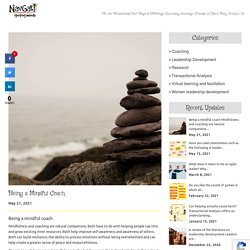
Discounting – How we stay stuck with denial - Navgati. Discounting – How we stay stuck with denial May 12, 2021 Have you seen phenomena such as the following A leader receives a 360 feedback report with scathing comments, but says, “The report was not useful.
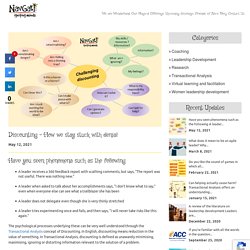
Rescuing - Helping that Harms - Navgati. Rescuing – Helping that Harms January 15, 2021 Can helping actually cause harm?
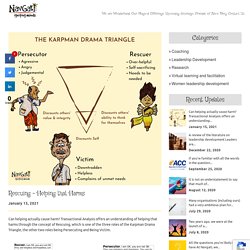
Transactional Analysis offers an understanding of helping that harms through the concept of Rescuing, which is one of the three roles of the Karpman Drama Triangle, the other two roles being Persecuting and Being Victim. While the roles of Persecutor and Victim are easier to understand and recognise, the role of Rescuer is somewhat more difficult to recognise, especially because we are encouraged to be selfless, generous and co-operative, Rescuers are compulsive helpers. The problem here is that they are meeting their own need to be needed rather than the needs of the person being helped. Rescuers use their perceived superiority (a “one-up” position) to ostensibly benefit the others, but simultaneously keep them powerless.
What does it take to build leaders? - Navgati. What does it take to build leaders?
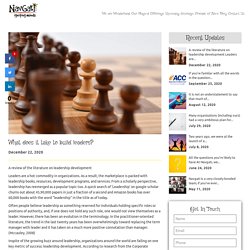
December 22, 2020 A review of the literature on leadership development Leaders are a hot commodity in organizations. ICF Coaching certification. Women Leadership Development. Why do we need women-only leadership development programs?
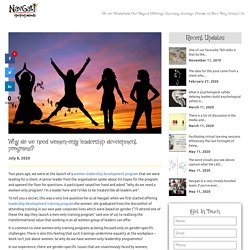
July 8, 2020 Two years ago, we were at the launch of a women leadership development program that we were leading for a client. A senior leader from the organisation spoke about his hopes for the program and opened the floor for questions. A participant raised her hand and asked “Why do we need a women-only program? I’m a leader here and I’d like to be treated like all leaders are”. Becoming an ICF certified coach - Navgati. Becoming an ICF certified coach June 24, 2020 All the questions you’re likely to have At Navgati, we have been running ICF accredited coach training programs for the last 8 years now and it’s been a richly rewarding experience for us to see trainee coaches grow in confidence and complete their International Coaching Federation certification requirements with ease.
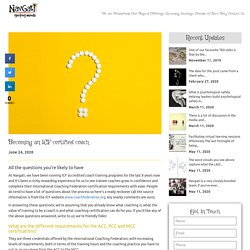
People do tend to have a lot of questions about the process so here’s a ready reckoner (all the source information is from the ICF website www.coachfederation.org; any snarky comments are ours). In answering these questions, we’re assuming that you already know what coaching is, what the value of training to be a coach is and what coaching certification can do for you. Learning in the time of Corona - Navgati. 25 ideas to keep your team connected when you're working from home - Navgati.
Coaching certification as a path to building leadership skills - Navgati. Coaching certification as a path to building leadership skills February 27, 2020.
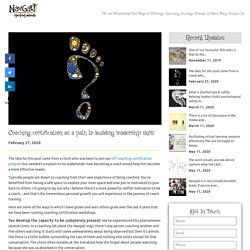
Psychological safety in the workplace - Navgati. Psychological safety in the workplace March 11, 2020 What is psychological safety Helping leaders build psychological safety in their teams should be an integral part of any leadership development program. Although several definitions of psychological safety have been proposed, the majority of studies have followed Amy Edmondson’s description. She defines team psychological safety as a shared belief that the team is safe for interpersonal risk taking. Team psychological safety is not the same as group cohesiveness, as research has shown that cohesiveness can reduce willingness to disagree and challenge others’ views, such as in the phenomenon of groupthink, implying a lack of inter-personal risk taking.
People tend to act in ways that inhibit learning when they face the potential for threat or embarrassment. The authors add, while some activities may potentially benefit the organization, they carry certain risks for the individual. Building safe workplaces. Leading with joy - A unique leadership strategy - Navgati. Leading with joy – A unique leadership strategy November 11, 2019 One of our favourite TED talks is that by the Israeli conductor Itay Talgam. He analyses the style of various conductors to draw lessons about leadership and he has this to say about one of them “What can you say the conductor was doing, actually?
Um, he was happy. And I often show this to senior management. This talk was in 2009 and in the last ten years, much has changed – people are less likely to be annoyed by the perception that happiness at work is an important thing. There’s certainly enough of a business case for this There’s the cost of inefficiency owing to disengagement (Source: The cost of replacing disengaged exits (Source: And the cost of brand rebuilding in the post-glassdoor world (Source: At an individual level, the losses keep mounting. Facilitation in Virtual Land - Navgati. ICF certified coach training. ICF certified coach trainingNavgati offers two ICF approved coach training programs: Leaders develop Leaders and Transformational Coaching. Both these programs take 4 months or more to complete, with participants investing approximately two days each month.
People could do one program with us and apply for the ACC credential or do both programs and apply for the PCC credential. The visionNavgati’s vision is to systematically develop coaches, deepen their skills and prepare them for the ICF credential. We envision ourselves to be a one-stop organization that that enables people to reach MCC levels. Executive coaching services. Executive Coaching Coaching is essentially a powerful conversation, a dialogue between a coach and a client within a productive, result-oriented context.
It provides a safe space to a client to think out loud on what they believe their potential is, why some of their potential may be unused and what they could do to release it. Often it involves clients examining their goals, agendas, beliefs, values and motivations. The structure of setting aside time for introspection with a neutral champion whose agenda is to further the client’s agenda, makes things happen for the client. Coaching works because coaches do the following: